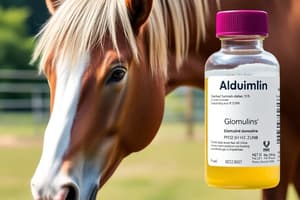Podcast
Questions and Answers
What is the primary purpose of establishing reference values in clinical laboratories?
What is the primary purpose of establishing reference values in clinical laboratories?
- To allow for ethical considerations in testing
- To provide a standard for comparing test results (correct)
- To minimize the costs associated with testing
- To ensure tests are performed with maximum speed
Which of the following is NOT a recommended safety practice in the laboratory?
Which of the following is NOT a recommended safety practice in the laboratory?
- Using food storage containers for laboratory materials (correct)
- Disinfecting glassware regularly
- Handwashing after handling biological samples
- Wearing a laboratory coat at all times
How can variations in technician skill levels affect laboratory testing?
How can variations in technician skill levels affect laboratory testing?
- They automatically void all test results
- They can introduce significant variability in results (correct)
- They are irrelevant to test accuracy
- They lead to more consistent test results
Why should measurements be done on a blind basis in clinical laboratories?
Why should measurements be done on a blind basis in clinical laboratories?
What practices are essential when handling potentially infectious samples?
What practices are essential when handling potentially infectious samples?
What does hematology primarily study?
What does hematology primarily study?
How is hematology significant in veterinary diagnosis?
How is hematology significant in veterinary diagnosis?
What are the contributing elements of hematology to animal diagnosis?
What are the contributing elements of hematology to animal diagnosis?
What does the term 'Hgb' refer to in the context of hematology?
What does the term 'Hgb' refer to in the context of hematology?
What is the main purpose of blood tests in veterinary medicine?
What is the main purpose of blood tests in veterinary medicine?
What is packed cell volume (PCV) primarily used for in veterinary medicine?
What is packed cell volume (PCV) primarily used for in veterinary medicine?
What does Packed Cell Volume (PCV) measure in veterinary hematology?
What does Packed Cell Volume (PCV) measure in veterinary hematology?
Which of the following components is NOT typically analyzed in veterinary hematology?
Which of the following components is NOT typically analyzed in veterinary hematology?
What type of blood sample is commonly used for clinical hematology analysis?
What type of blood sample is commonly used for clinical hematology analysis?
Which laboratory procedure is essential for ensuring the accuracy of hematology test results?
Which laboratory procedure is essential for ensuring the accuracy of hematology test results?
Which of the following stains is typically used in veterinary clinical hematology?
Which of the following stains is typically used in veterinary clinical hematology?
What is a primary goal of performing a microscopic examination of blood in veterinary hematology?
What is a primary goal of performing a microscopic examination of blood in veterinary hematology?
Which of the following is primarily focused on in the evaluation of hematological disorders?
Which of the following is primarily focused on in the evaluation of hematological disorders?
Flashcards are hidden until you start studying
Study Notes
Veterinary Hematology
- The study of blood and the tissues that form, store, or circulate blood cells.
- A crucial branch of diagnostic pathology as blood provides oxygen, nutrients, and carries waste throughout the body.
- Hematology is used in conjunction with clinical chemistry, parasitology, histopathology, urinalysis, and cytology to provide information for diagnoses.
Course Information
- Taught by Dr. Elshafie Ibrahim Elshafie
- Lecture held on Sundays from 10:00-11:50 in A06
- Lab held on Thursdays from 10:00-11:50 in AGR/0070
- Office hours are held on Mondays from 10:00-12:00 in room 138.
Course Description
- Focuses on fundamental veterinary hematology for undergraduate veterinary technology students.
- Covers manual and automated hematology techniques used to study blood.
- Blood tests are used for animal health screenings and disease diagnosis.
Course Content
- Introduction to hematology
- Importance of blood and its various functions.
- Components of blood and cell types
- Types of blood samples used in veterinary clinical hematology
- Morphology of erythrocytes, leukocytes, and thrombocytes across animal species
- Types of stains used in veterinary clinical hematology
- Total and differential WBC and erythrocyte counts
- Importance of Packed Cell Volume (PCV) and Hemoglobin (Hgb) estimation
- Hematological disorders
- Blood Transfusion
Laboratory Safety
- All biological samples are treated as potentially infectious.
- Routine hand washing and disinfection of glassware is required.
- No eating, drinking, or food storage in the lab area.
- Laboratory coats should be worn at all times.
- Gloves should be worn when handling potentially infectious samples.
- All disposable sharps should be placed in an appropriate container.
Course Learning Outcomes
- Understand the importance of clinical hematology in veterinary medicine.
- Learn about the composition of animal blood and relevant laboratory instruments.
- Recognize types of samples used in veterinary clinical labs and their uses.
- Understand techniques, procedures, and sites for blood collection in various animal species.
- Master procedures for microscopic blood examination, including differential and total cell counts, blood cell morphology evaluations, and calculation of absolute values.
Studying That Suits You
Use AI to generate personalized quizzes and flashcards to suit your learning preferences.




